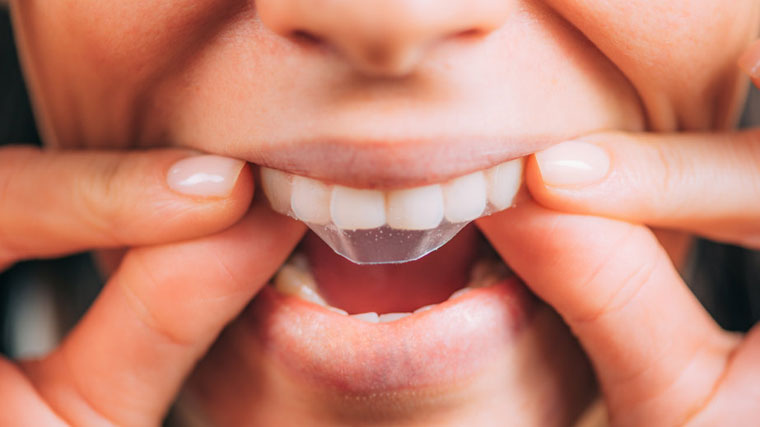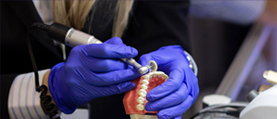Teeth are an important part of our persona. In addition to chewing, teeth are crucial part of our face which in turn is a part of our total persona. When teeth are not white enough, it makes for less than a perfect smile. For aesthetic reasons, some people want their teeth to look whiter and brighter for a perfect smile. To get your teeth whitened there are many products that are available over the counter and these can be used at home with manufacturer’s instruction to make your teeth look a shade lighter and remove stains from the teeth which you may have acquired because of your lifestyle choices, or because of medicinal requirement.
What are teeth whitening strips?
Teeth whitening strips are basically teeth bleaching treatments, readily available over the counter. They are thin strips coated with a chemical solution. These strips are supposed to be kept on the teeth for a stipulated time depending on the concentration of the solution used, and then peeled off, which will result in whiter teeth. These strips can be used to lighten the stains which can be bleached are caused by the use of tobacco, red wine, coffee, or ageing.
How do whitening strips work?
The colour of the teeth varies among individual. Most people have various shades ranging from yellow to grey, but very rarely we have perfectly white teeth. But somehow people believe that teeth should be very white to look natural and beautiful.
The solution used on the strip consists of hydrogen peroxide or carbamide peroxide; which breaks down into hydrogen peroxide when applied. Hydrogen peroxide, when comes into contact with water breaks down the stains on the surface of the teeth into very tiny pieces, thus dismantling the stain. The stain is dissipated and the teeth look whiter and shiny. The time required to dissipate the stain depends on the concentration of the hydrogen peroxide on the strip. Less time required if more concentrated solution is applied on the strip.
Composition of Human tooth
The teeth have multiple layers, made up of hard tissues and soft tissues. Hard tissue includes enamel, dentin and cementum, whereas pulp consists of nerves, blood vessels, connective tissues that bind the tooth to the gums and roots. Enamel is the outer most, hardest part of the tooth, which keeps the tooth protected. The enamel gives teeth its colour which ranges from greyish, to yellowish and white. The colour of the enamel depends on the minerals therein. Dentin is the next layer of the tooth and adds to the bulk and structure. It is slightly impressionable, and is yellowish in colour. Cementum, a bone like substance, surrounds the root of the tooth and protects it. Pulp is innermost substance consisting of blood vessels and nerves and keeps the tooth alive.
Are the teeth whitening strips safe to use?
Since perfect smile is significant for happy social life, millions of people across the world use teeth whitening treatments, among which whitening strips are most common. Currently there are a few published researches which is throwing lights on the use of teeth whitening strips and whether it harms the teeth. Stockholm university funded a research study to find out the chemical effects of hydrogen peroxide on the tooth. The researcher, Kelly Keenan found that teeth do get affected by hydrogen peroxide and the structure of the tooth changes because of this effect.
Basically, hydrogen peroxide is an oxidizing agent. It is sometimes used a sanitizer and also as a hair colouring agent. In teeth whitening strips it is used as a bleach which breaks down the stains on the teeth into minute particles which are washed away and are not visible after the treatment. The chemical has been found to affect the protein contained in middle and inner layer of the tooth. The hydrogen peroxide found in the strips that are available in pharmacies without prescriptions erodes the structure of the teeth they are applied on. The chemical in the strip can penetrate through the outer layer of enamel and get into dentine. As is known, dentine is made up of collagen; a protein composition. The collagen which is part of dentine becomes fragmented when it comes into contact with hydrogen peroxide which results in a lesser amount of collagen and therefore protein in the dentine layer.
If the hydrogen peroxide treatment continues and used frequently, then it can be said that it may result in diminished collagen protein affecting the health of teeth, because of fragmentation of the collagen into tiny bits and pieces which will be very harmful for health of teeth.
The health of the teeth will definitely suffer if the teeth whitening strips are used frequently, whether done at home or done by the dentist in his office. The amount of hydrogen peroxide used in each treatment also determines how much damage can be caused by the treatment. When the chemical is more concentrated, and in higher dose, it will affect the teeth more and will cause more damage.
The research done by Kelly Keenan showed the damage done to the dentine. But it is not conclusive about the effect it may have over a period of time. Teeth are alive, and dynamic. They continue to thrive and are kept healthy by the flow of oxygen and nutrients through blood vessels in the nerves. It is not yet determined whether the damage is reversible. Whether the lost collagen protein gets replenished after the treatment or it is permanently lost.
Many dentists feel that the teeth whitening strips are harmless, because they have been using the same for many years now and they do not recall any cases where they have found the teeth getting affected by the use of hydrogen peroxide treatment.
It is imperative to go deeper into the area and get many researches published to come to a conclusion about the ill effects of teeth whitening strips on the teeth and whether to restrict the use of teeth whitening strips being sold over the counter.




